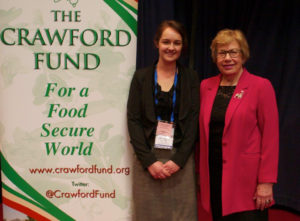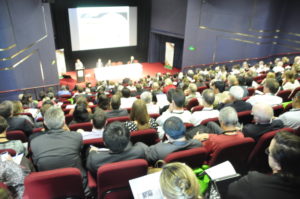

2016 Conference
WASTE NOT, WANT NOT:
The Circular Economy to Food Security
29-30 August 2016, Canberra

Our 2016 EventThe Crawford Fund’s annual conference holds a key place in the development and food security calendar in Australia. For more than two decades we have successfully brought into focus an issue worthy of global and Australian attention. This year was no exception. Titled ‘Waste Not, Want Not: The Circular Economy to Food Security’, our 2016 conference was held in Canberra on 29 and 30 August and focused on food loss and waste issues along the supply chain—in production, in getting product to market, and in the management and reuse of waste, with a special presentation on the role of supermarkets. An overview of the conference, provided by our Chief Executive Dr Denis Blight, can be viewed here, and our full 2016 conference proceedings are now available. Our Conference was held just as as a number of international and Australian efforts and innovations get underway within both the public and private sectors in research, policy and on-the-ground action. Our conference this year included the Sir John Crawford memorial address at our popular networking dinner on 29 August. Special Lunch-Time DiscussionDelegates who registered early had the opportunity to sign up for an additional opportunity to engage with some of our speakers. While we had our normal extended lunch session, which is a popular broader networking opportunity, this year we also offered a limited number of delegates an opportunity to interact with speakers in more intimate discussion and Q&A. These delegates were able to interact with some speakers in the nearby South Courtyard. Conference Scholars ProgramWe continued our successful Conference Scholars Program to encourage young people in their study, volunteering or careers in international agricultural research. Conference delegates helped us in these endeavours and some donated to the scholars program when they were prompted in the registration process.  Or you may like to consider nominating and supporting a young person for a scholarship that will include travel, accommodation and conference attendance, mentoring throughout the event and also a day’s worth of special activities and engagement before and after the conference. The cost for a scholarship is $2000 and you can contact Cathy Reade for further information or call Cathy on 0413 575 934. We have had tremendous feedback on the benefit to those attending our event in having young people involved so hope many who attend the conference will also support our efforts so we can grow our alumni of early career attendees. Conference StructureFollowing our opening by our Chair, the Hon John Kerin AM, our Program included:
|
 This provided an ideal time to delve deeper into the way ahead around food loss and waste for improved food security, rather than going over the extensive global discussions to date. By attracting the world’s best speakers, providing extended question and answer sessions and opportunities for informal networking, the Fund’s annual conferences enabled participants to contribute and to place food security issues into a context relevant to their lives and work. And being the key event around food security, the networking opportunities were highly appreciated.
This provided an ideal time to delve deeper into the way ahead around food loss and waste for improved food security, rather than going over the extensive global discussions to date. By attracting the world’s best speakers, providing extended question and answer sessions and opportunities for informal networking, the Fund’s annual conferences enabled participants to contribute and to place food security issues into a context relevant to their lives and work. And being the key event around food security, the networking opportunities were highly appreciated.